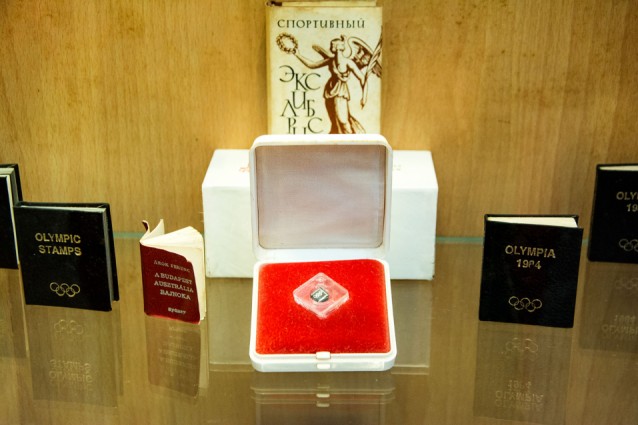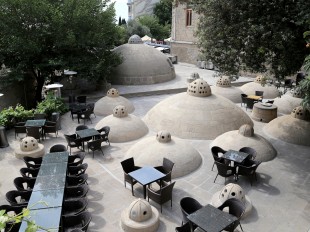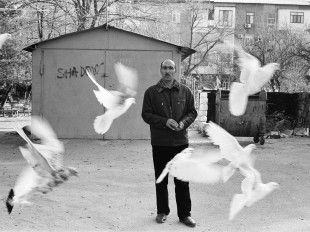Ever since cuneiform tablets in the Ancient Near East, humans have been collecting written knowledge in libraries and museums. But it was not until very recent history, just 15 years ago, that an entirely new type of repository was established: a museum specifically dedicated to small-sized volumes of print. The Museum of Miniature Books in Baku, Azerbaijan, the very first of its kind, is sheltered in the old city (Icheri Sheher) of this modern metropolis. The creator and founder of this unique museum is Ms Zarifa Salakhova, Honoured Worker of Culture of Azerbaijan, member of the national commission for UNESCO, who kindly agreed to talk about her life’s work – the Museum of Miniature Books.
It’s better to let the world see these books than keep them in my storerooms
VoA – Hello, Zarifa khanim! I would like to congratulate you on your 85th birthday on behalf of the editorial staff and on behalf of our readers, as well as on two other significant dates – the 15th anniversary of your museum and the 35th anniversary of your collection. According to the media, there are about 6,500 books from 64 countries in your collection: is this true or is this information outdated?
ZS – This information is outdated. There are over 8,500 books published in 80 countries in my collection. 5,555 books are presented here in 39 window displays in the museum in Baku, 1,051 books are exhibited in 14 window displays in the Heydar Aliyev Palace in Nakhchivan, and 1,052 books are exhibited in 15 window displays in Ganja. And most recently, this year on 6 November, I opened a museum in Markhal, Sheki, which contains 620 books in six window displays. It’s better to let the world
see these books than keep them in my storerooms.
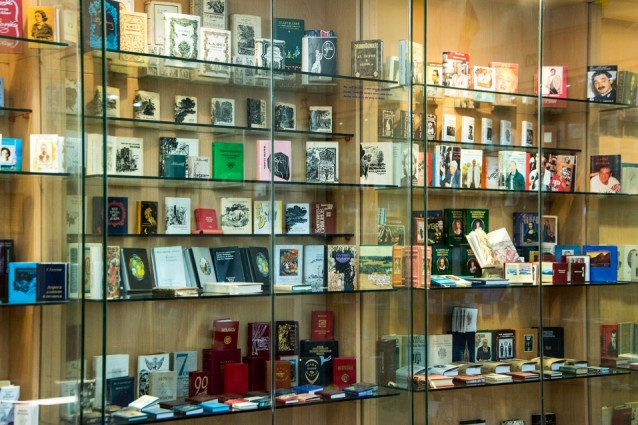 The musuem in Baku houses 5,555 books in 39 window displays and is a popular stop on the Icheri Sheher tourist route. Photo: Aurelia Nasirova
The musuem in Baku houses 5,555 books in 39 window displays and is a popular stop on the Icheri Sheher tourist route. Photo: Aurelia Nasirova
Given your education at the Pedagogical School named after Sabir followed by the Pedagogical Institute of Russian Language and Literature named after Akhundov, books have always been a part of your life. Where does this love for miniature books come from? How did it all start?
In 1981, I went to work for the Azerbaijan book lovers society as its first deputy chairman. It was called the “Voluntary Society of Book Lovers of the Republic of Azerbaijan.” The chairman of the society was Zakir Narimanovich Bagirov, the minister of culture at the time, and I was the financial manager. At that time very few people knew about this society. Our society was subordinate to Moscow and the All-Union Society of Book Lovers, which exists today, but as an international one now. We often went to Moscow. In November 1982, I was offered to buy a complete collection of Krylov fables with illustrations, the 1835 edition, a small-format edition that cost 23 roubles – not cheap for those days. I paid the accounts department and went down to the warehouse. There I saw six titles of miniature books. I immediately bought them. The circulation of these books was 500 copies and I wouldn’t have found them in shops.
Every Wednesday, the society of miniature books held meetings under the all-Union society. There, I met different people and made contacts. In 1985, I published “Persian Motifs” by Yesenin in a miniature edition. The idea to publish “Persian Motifs” came after the artist Shalygina, who lived in Baku at the time, had illustrated it and showed it to me. I liked it so much that I decided to publish it. The first all-Union meeting of miniature book lovers was held in December 1985 in the city of Perm in Russia. When the Perm collectors saw this book, they were delighted. The meeting lasted three days. During this time, they gathered a whole box of miniature books for me published in different years in different cities. Since then, for 35 years already, I’ve been publishing and collecting miniature books. During this time, I’ve published 220 miniature books.
I’m very pleased that the guides in Icheri Sheher begin their tours of the old city with our museum
This year on 23 April your museum turned 15. Why did you decide to open the museum on 23 April?
I chose this day because, according to a decision by UNESCO, this day is celebrated as the international day of books and copyright throughout the world. This is a symbolic date because on 23 April 1616 Cervantes and Shakespeare passed away. During these 15 years the museum has been visited by over 200 thousand visitors. I’m very pleased that the guides in Icheri Sheher begin their tours of the old city with our museum.
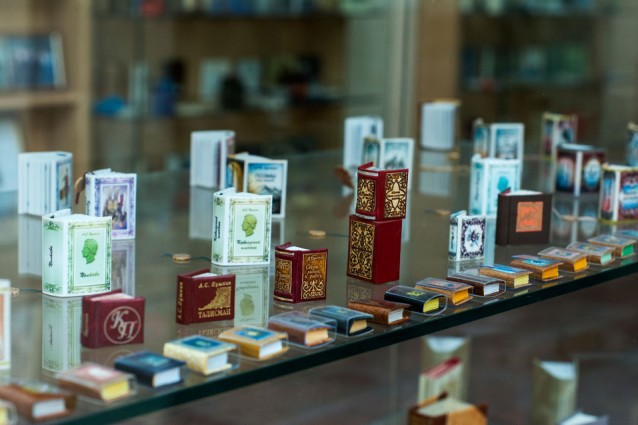 The collection features miniature books in diverse languages, genres and styles. Photo: Aurelia Nasirova
The collection features miniature books in diverse languages, genres and styles. Photo: Aurelia Nasirova
I know that Heydar Aliyev himself supported your idea of establishing the museum. Tell our readers about this amazing person.
This is a separate story – on 10 October 1993 Heydar Aliyev was elected for his first presidential term. I was present at the inauguration. His brilliant program speech, which he delivered in one hour ten minutes, made a huge impression on me. I told myself that I should publish it in miniature. I have Kennedy’s inaugural speech in my collection which was published in Holland after his death. I found a sponsor. He sent me to Moscow and I published his famous speech entitled “The Oath of Fidelity to the Motherland, the State, the People” at the 5th Exemplary Printing House in English-Russian and then in Azerbaijani-English.
On 3 June 1995, a presentation of this book took place at the National Library named after Akhundov, in the hall of foreign literature. I exhibited 2,000 miniature books from my collection. During my speech, I said that if a place were to be found, I would establish a museum of miniature books and bequeath the books to the city. There were many speakers there, but when Heydar Aliyevich [Aliyev] spoke, he twice referred to my speech. After the official part of the presentation, Heydar Aliyevich approached and examined my collection. He was surprised by the number and uniqueness of the exhibits. He asked me: “Zarifa, are all these books yours?” I said: “Heydar Aliyevich, there are 2,000 here, but I have 4,000 in total.’’ After reviewing the collection on show, he very much liked the edition of “Farhad and Shirin” by Alisher Navoi. I presented it to him. Then he liked Rerikh (Nikolai Rerikh, the Russian painter and writer – Ed.). Heydar Aliyevich himself used to draw and wanted to apply to the faculty of architecture. He even entered it but then the war began, and so on. I gave it to him too. And when he saw the 1837 facsimile edition of “Eugene Onegin,” published during Pushkin’s lifetime, he was very surprised. For a long time he didn’t want to take this book. But I convinced him, saying: “Let it be three.” Then I took him to the stand where there were 10 volumes of Honecker and said: “There’s no GDR, but the books are still here.” He looked at me and said: “The books are indeed still here.”
After this event five months passed and then I wrote a letter to the city administration about allocating a space for the museum. Four more months passed and the architect from the Architecture Administration called me and said: “Zarifa Teymurovna, I was instructed to walk with you through Icheri Sheher and whichever place you choose, we will give you permission for it.” That’s how on 23 April 2002 our Museum of Miniature Books opened. Heydar Aliyev was very far-sighted. Back then he valued my collection; he valued its importance not just for Azerbaijani culture, but for global culture too. This is confirmed by the Guinness Book of Records, which our museum entered on 1 October 2014 with the 2,913 unique specimens from our collection.
You have a unique collection, Zarifa khanim. Is there a book that you cherish the most, which is close to your soul, and if so, what is the story behind how you acquired it?
The most valuable book in my collection is a Qur’an, a Qur’an that was published in Saudi Arabia in 1672 according to our calendar. At the end of the 19th century in Poland, it was miniaturised by a mechanical and reproductive method and inserted into a case with a magnifying glass by a bibliophile with the surname Schulz. This is the most valuable book. I have two books like this: One was given to me by an elderly woman. She lived in the village of Mashtaga, near Baku. She found out that I collect miniature books. The Qur’an was hanging around her neck all the time in a leather bag. And the second Qur’an was given to me by a Russian artist. He learned from my brother about my addiction to miniature books. He wanted the book to be here in the museum. The most valuable fiction book is undoubtedly the edition of Pushkin’s “Eugene Onegin” published during his lifetime in 1837.
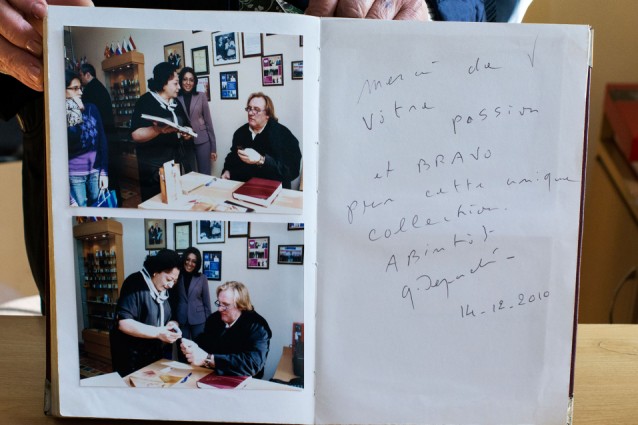 The museum has been visited by over 200,000 visitors in 15 years, including by celebrities from around the world. This is a guest book entry by French actor Gerard Depardieu. Photo: Aurelia Nasirova
The museum has been visited by over 200,000 visitors in 15 years, including by celebrities from around the world. This is a guest book entry by French actor Gerard Depardieu. Photo: Aurelia Nasirova
Each book has its own story. Tell our readers one of the most interesting in your opinion.
One of these is the book about Fidel Castro with his personal autograph. In 2010 I was on holiday in Bulgaria at the dacha, on the coast of the Black Sea, with my long-time friend, the famous Bulgarian singer Yordanka Hristova. One evening we were sitting and watching TV and suddenly they showed Fidel Castro giving an interview; he had recovered. I asked Yordanka: ‘‘How old is Fidel?’’ She said: ‘‘84.’’ She is loved in Cuba. She was one of Fidel Castro’s favourite performers and often went to Cuba to give concerts. I offered to publish a miniature book about him. Thanks to her, two months later a text was sent from Cuba in Spanish and Russian, which was the material for a future book. I published this book.
It just so happened that an international culture forum was held in Baku for the first time in April 2011. The Minister of Culture flew from Cuba and visited the forum together with the ambassador. He really liked my exposition. I took out two sets of a two-volume book about Fidel Castro and asked him to give them to the Cuban People’s Friendship Institute and for one to be given to Fidel Castro. In early June 2011, I received an invitation to Cuba. On 10 August 2011 a presentation of this edition took place in Cuba in a house of celebrations where I read out a congratulations from our president addressed to Fidel Castro. For Cuba, it was a sensation. On the fourth day of my stay, my female interpretor said: “Today Zarifa you will be received by the president of the House of the Americas.’’ In the old town in an old Spanish style two-storey mansion we were met by a tall, lean, interesting elderly man – the president of the House of the Americas. He turned out to be the right hand man of Fidel Castro. And five months later, on my 80th birthday, two employees of the Cuban People’s Friendship Institute were sent here with congratulations and a gift – a painting by a famous Cuban female artist, and most importantly the 10 copies of miniature books that I left in Russian with Fidel Castro’s autograph.
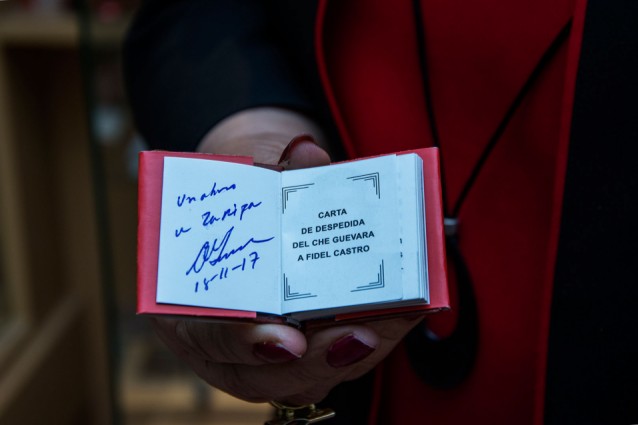 Che Guevara’s Farewell Letter to Fidel Castro signed by Che Guevara’s daughter. Photo: Aurelia Nasirova
Che Guevara’s Farewell Letter to Fidel Castro signed by Che Guevara’s daughter. Photo: Aurelia Nasirova
Tell us about your latest edition to date.
The last book I published was “Che Guevara’s Farewell Letter to Fidel Castro.” In November this year, I visited an international forum in Bulgaria, where I met Che Guevara’s daughter and she signed one of the copies for me. It occupies a worthy place in my collection.
Your collection is visited and admired by many different people, many famous people included. The Thai princess was one such guest...
Yes, last summer they called me and said that in a month the Princess of Thailand would arrive in Baku especially to visit my museum. She was delighted with my collection and presented 38 miniature books published in Thailand as a gift to the museum: a collection of children’s fairy tales, as well as an autobiographical edition about her father, the King of Thailand, in miniature, which the princess wrote herself, and a personal publication – the princess’ photographic works also in miniature.
The crunch and fragrance of the pages is something that cannot be replaced
What do you think, Zarifa khanim, has the internet taken ascendency over the book? What is your favourite publication and who is your favourite author?
I don’t think that the internet has taken the place of the book, judging by the interest shown by tourists towards books and the museum. I believe that books will always live and attract interest. It’s one thing when you harm your eyesight by looking at a computer, and another thing when you open a classic publication. The crunch and fragrance of the pages is something that cannot be replaced. My favourite author, this is the entire collection of Jack London. Of the Russian classics, of course Tolstoy, Dostoevsky.
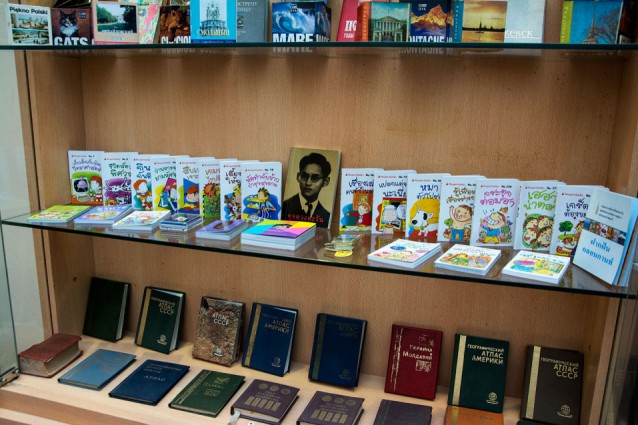 Gifts from the Thai princess who came to Baku last summer especially to visit the Museum of Miniature Books. Photo: Aurelia Nasirova
Gifts from the Thai princess who came to Baku last summer especially to visit the Museum of Miniature Books. Photo: Aurelia Nasirova
Our conversation was long and incredibly interesting. Ms Zarifa Salakhova is an amazing person and an incredibly engaging interlocutor. If you are visiting Baku’s old town of Icheri Sheher, do not pass by the Museum of Miniature Books. You will be met by an elegant elderly lady, the very founder of this amazing place of world culture, Zarifa Salakhova herself, and she will tell you the incredible stories of her life, as well as the story behind the idea and creation of her brainchild – the Museum of Miniature Books, the only place in the world with such a large and rich collection of literature in miniature form.
About the author: Aurelia Nasirova is a Bulgarian freelance writer and photographer living and working in Baku.
